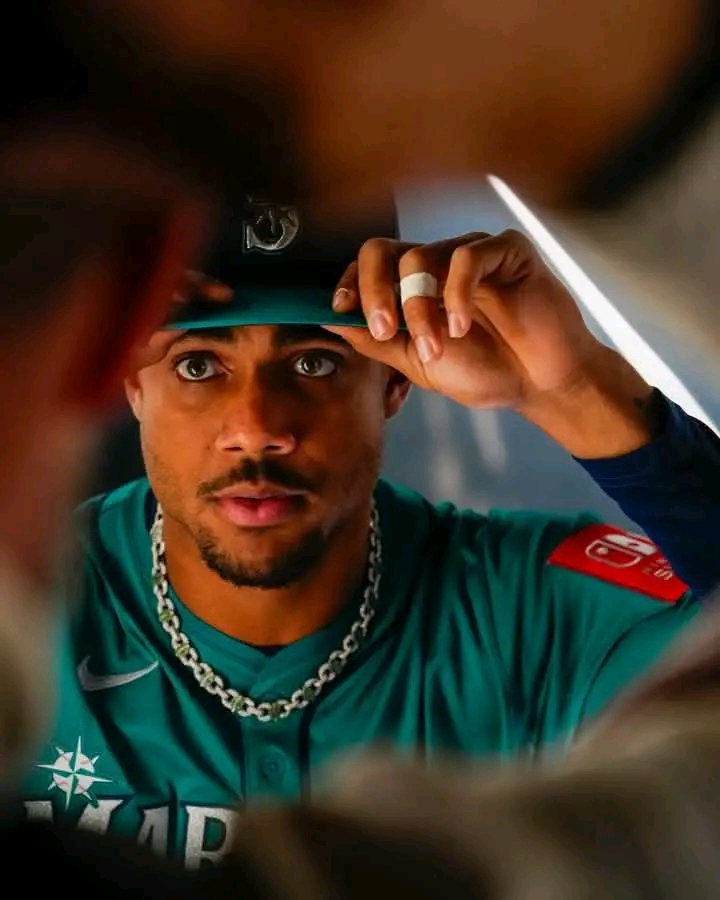
$210 Million Can’t Buy Balance: Insider Warns Mariners’ Star Julio Rodríguez as Pressure Mounts Despite Record-Breaking Deal
When Julio Rodríguez signed his jaw-dropping contract extension with the Seattle Mariners—an unprecedented deal that could be worth up to $210 million—it was supposed to symbolize the beginning of a golden era in the Pacific Northwest. The young Dominican sensation, affectionately known as “J-Rod,” wasn’t just the face of the Mariners; he was their future, their promise, and their financial centerpiece.
But with every dollar came expectation—and, according to one former MLB scout, those expectations are becoming a heavy weight on Rodríguez’s shoulders.
> “Fame and money can rise faster than maturity,” the ex-scout said. “He’s a phenomenal player, but the pressure cooker in Seattle is heating up. When the team doesn’t win, people start counting zeroes on your contract, not home runs.”
—
The Rise of a Superstar
Since debuting in 2022, Rodríguez’s ascent has been meteoric. His combination of charisma, athleticism, and clutch performances turned him from a promising prospect into one of baseball’s most marketable stars almost overnight. He became the face of countless MLB promotions, gracing magazine covers and even drawing comparisons to Ken Griffey Jr.—a name that carries near-religious weight in Seattle sports culture.
The Mariners, long starved of postseason success, invested heavily in that promise. His contract, which includes performance-based escalators that could push the value even higher, was seen as a statement that Seattle was all-in on building around its homegrown cornerstone.
Yet, as one Mariners insider quietly put it:
> “It’s hard to enjoy the game when you’re the symbol of a franchise’s hopes, finances, and marketing machine all at once. Julio’s not just playing baseball—he’s carrying an economy.”
—
When Stardom Outpaces Stability
The whispers began during the 2025 season. Despite a strong start, Rodríguez’s numbers began to dip slightly by midsummer—nothing catastrophic, but enough to spark murmurs among fans and pundits alike. Social media chatter grew, talk-show debates intensified, and national commentators began asking the inevitable question: Was he worth that much, this soon?
For the first time, Rodríguez looked human—slumping through a few tough weeks, dealing with nagging injuries, and facing the kind of scrutiny that no amount of highlight reels could deflect.
The same scout who spoke out about the pressures of stardom believes this is part of a larger trend in modern baseball.
> “We hand these kids massive deals before they’ve had a chance to grow through failure,” he explained. “Rodríguez is immensely talented, but every player—no matter how good—hits a wall when expectations grow faster than experience.”
—
The Seattle Spotlight
Seattle is a sports city that feels its heartbreaks deeply. The Mariners’ 2001 playoff run remains the franchise’s defining moment, and the years since have been filled with “almosts” and “not yets.” When Rodríguez arrived, the hope was that the drought would finally end—that he’d be the one to lead them back to October glory.
Instead, the weight of that dream has fallen squarely on his 24-year-old shoulders. Each time the team falters, the narrative circles back to him.
A Mariners front office source admitted that even they underestimated the cultural impact of the deal.
> “We knew it was big,” the source said, “but we didn’t realize how much it would change everything—how fans, the media, and even other players look at him. Julio doesn’t just represent the Mariners; he represents the future of small-market stars getting paid.”
That reality has created both pride and pressure. Rodríguez’s off-field commitments have skyrocketed—endorsement deals, charity appearances, media duties—all while maintaining the grueling rhythm of a 162-game season.
—
Mental Game Over Money Game
While Rodríguez continues to say the right things publicly—speaking about gratitude, teamwork, and staying humble—those close to him know the struggle is real. The challenge isn’t just physical; it’s mental.
Former players who’ve experienced similar fame warn that balance is the key.
> “When I look at Julio, I see a young man trying to manage being an athlete, a brand, and a city’s hope,” said one retired MLB veteran. “That’s not easy. Money can solve a lot, but it can’t fix burnout.”
Indeed, sports psychologists have pointed out that the new era of mega-contracts has created a different kind of pressure: the burden of being “the investment.” Every swing, every post-game quote, every public appearance is weighed not just by performance, but by value.
Rodríguez’s work ethic and passion for the game have never been in question. His teammates often praise him for his energy and leadership. But the reality is that being the highest-paid player in franchise history means there’s little room for error—and even less for rest.
—
What Comes Next
Despite the challenges, Rodríguez’s story is far from one of decline. His raw ability and drive remain unmatched, and the Mariners organization continues to back him wholeheartedly. Sources within the team say there are ongoing efforts to provide him with additional mental performance support, as well as to ease media obligations during high-pressure stretches.
The goal? To help Julio Rodríguez rediscover the joy that made him such a captivating figure in the first place.
As one team official put it:
> “We don’t need Julio to be perfect—we just need him to be Julio again.”
It’s a reminder that behind every headline, every dollar figure, and every stat line is still a person—a young man who loves the game and the city he represents.
If he can find that balance again, both he and the Mariners might yet prove that the $210 million wasn’t just money spent on talent, but an investment in hope.
And as the ex-scout who started the conversation concluded:
“He’s got everything it takes. But baseball’s not just about what you do on the field—it’s about how you handle everything that c
omes after. And that’s the hardest part to master.”
In Seattle, they still believe in
Leave a Reply